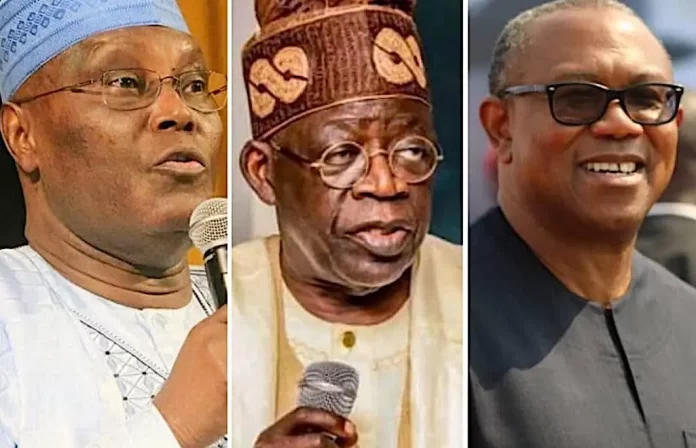By Michael Egbebike, PhD
As Nigeria approaches the 2027 general elections, the nation’s political stage is undergoing one of its most dramatic realignments since the return to democracy. The recent defection of former Vice President Atiku Abubakar from the People’s Democratic Party (PDP) to the African Democratic Congress (ADC), combined with reports of 26 Senators and 31 Members of the House of Representatives following him, has reshaped the terrain. At the same time, the PDP is extending overtures to Mr. Peter Obi, while internal party factions like Wike’s G5 remain a factor.
The Atiku Move: Strategy or Sabotage?
Atiku’s move to the ADC is widely interpreted as a final effort to secure a presidential ticket, particularly given widespread sentiment that the presidency should rotate to the South. In defending the shift, figures like Mr. Andy Okonkwo have argued that a northern candidate like Atiku would better consolidate the ADC coalition – a position viewed by many as either a regional power play or an attempt to sideline Obi. Okonkwo’s posture, whether motivated by strategy or personal bias, illustrates how deep these rivalries run.
Atiku’s maneuver may offer ADC immediate political clout – especially with the alleged legislative defections – but it also introduces instability. The ADC, until recently a fringe party, may lack the internal cohesion to manage heavyweight political actors with competing ambitions.
PDP’s Calculated Invitation
Meanwhile, the PDP, now facing the Atiku vacuum, has opened the door for Obi’s return. On the surface, this may appear attractive: PDP boasts the widest political network in Nigeria, deep-rooted structures, and long-term electoral experience. But the internal dynamics are complex. The Wike-led G5 governors remain a potent faction, and previous tensions between Obi and Wike could derail any consensus. Would PDP genuinely support Obi as a southern candidate, or merely use him to reclaim lost ground?
Moreover, the PDP brand remains tainted in the eyes of many young Nigerians, especially those in the Obidient Movement who see the party as emblematic of the problems Obi has long stood against.
ADC Surge: Real Power or Illusion?
If the reported defection of 26 Senators and 31 Representatives to ADC is verified, this provides Atiku a narrative advantage – a semblance of momentum. However, Nigerian political history is filled with defections that were reversed, overstated, or inconsequential by election day. Without ideological unity, such legislative mass movements can be fleeting. It’s also unclear whether these lawmakers defected based on principle or proximity to power.
The Obi Dilemma: Structure vs. Independence
Peter Obi stands at a crossroads. He can return to PDP, where he may inherit the presidential ticket now that Atiku has departed. He could join ADC – though this risks being overshadowed by Atiku again. Or, he could remain in the Labour Party and expand his independent coalition.
Each option carries risks:
– PDP offers national infrastructure but comes with historical baggage, internal divisions, and lingering skepticism among Obi’s base.
– ADC has the advantage of current momentum, but may serve as another Atiku vehicle, not a neutral ground.
– Labour Party lacks widespread structure but gives Obi moral clarity, grassroots support, and control of his messaging.
A Divided Opposition: Tinubu’s Path to Victory
Perhaps the most overlooked consequence of this political realignment is what it means for President Bola Tinubu. In 2023, Tinubu won with just 36.6% of the vote – benefiting from a split opposition. Should Obi and Atiku run separately again in 2027, they risk handing Tinubu a second term by default.
A fragmented opposition – even one full of credible candidates – could once again allow the incumbent to win with a minority vote. Political arithmetic, not emotion, will decide 2027.
As one political analyst tweeted, “Obi and Atiku running separately is a gift Tinubu doesn’t even need to ask for.”
Conclusion: Unity or Bust?
Peter Obi must now make the most difficult political decision of his career – one that may determine not only his fate but the direction of Nigeria’s democracy. Any decision must consider not just party structures or personal ambition, but the broader goal: removing a failing status quo and replacing it with people-centered governance.
Whether Obi leads or supports a broader coalition, unity must be prioritized. Nigeria cannot afford another fragmented opposition in 2027.
As Obi has often said, “I’m not desperate to be president; I’m desperate to see Nigeria work.”
That desperation – properly channeled – may yet inspire the kind of political unity that the moment demands.
About the Author: Dr. Michael Egbebike is a lawyer, Environmental Scientist, Civil Engineer, Land Surveyor and Public affairs analyst, and advocate for good governance in Nigeria. A former commissioner for Environment, Dr. Egbebike now lectures pro-bono at the University of Nigeria, Enugu Campus and Nnamdi Azikiwe University Awka.







